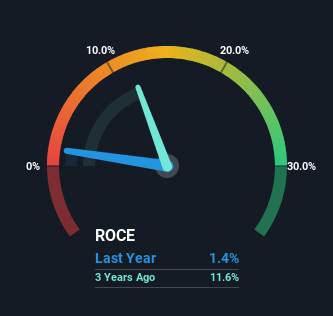There Are Reasons To Feel Uneasy About Billion Industrial Holdings' (HKG:2299) Returns On Capital

To find a multi-bagger stock, what are the underlying trends we should look for in a business? Typically, we'll want to notice a trend of growing return on capital employed (ROCE) and alongside that, an expanding base of capital employed. If you see this, it typically means it's a company with a great business model and plenty of profitable reinvestment opportunities. However, after briefly looking over the numbers, we don't think Billion Industrial Holdings (HKG:2299) has the makings of a multi-bagger going forward, but let's have a look at why that may be.
Understanding Return On Capital Employed (ROCE)
For those that aren't sure what ROCE is, it measures the amount of pre-tax profits a company can generate from the capital employed in its business. Analysts use this formula to calculate it for Billion Industrial Holdings:
Return on Capital Employed = Earnings Before Interest and Tax (EBIT) ÷ (Total Assets - Current Liabilities)
0.014 = CN¥161m ÷ (CN¥26b - CN¥15b) (Based on the trailing twelve months to June 2023).
Therefore, Billion Industrial Holdings has an ROCE of 1.4%. In absolute terms, that's a low return and it also under-performs the Luxury industry average of 10%.
See our latest analysis for Billion Industrial Holdings

Historical performance is a great place to start when researching a stock so above you can see the gauge for Billion Industrial Holdings' ROCE against it's prior returns. If you're interested in investigating Billion Industrial Holdings' past further, check out this free graph covering Billion Industrial Holdings' past earnings, revenue and cash flow.
The Trend Of ROCE
When we looked at the ROCE trend at Billion Industrial Holdings, we didn't gain much confidence. To be more specific, ROCE has fallen from 14% over the last five years. However it looks like Billion Industrial Holdings might be reinvesting for long term growth because while capital employed has increased, the company's sales haven't changed much in the last 12 months. It may take some time before the company starts to see any change in earnings from these investments.
On a side note, Billion Industrial Holdings' current liabilities are still rather high at 58% of total assets. This can bring about some risks because the company is basically operating with a rather large reliance on its suppliers or other sorts of short-term creditors. Ideally we'd like to see this reduce as that would mean fewer obligations bearing risks.
Our Take On Billion Industrial Holdings' ROCE
Bringing it all together, while we're somewhat encouraged by Billion Industrial Holdings' reinvestment in its own business, we're aware that returns are shrinking. And in the last five years, the stock has given away 66% so the market doesn't look too hopeful on these trends strengthening any time soon. Therefore based on the analysis done in this article, we don't think Billion Industrial Holdings has the makings of a multi-bagger.
Since virtually every company faces some risks, it's worth knowing what they are, and we've spotted 2 warning signs for Billion Industrial Holdings (of which 1 is a bit concerning!) that you should know about.
While Billion Industrial Holdings may not currently earn the highest returns, we've compiled a list of companies that currently earn more than 25% return on equity. Check out this free list here.
Valuation is complex, but we're here to simplify it.
Discover if Billion Industrial Holdings might be undervalued or overvalued with our detailed analysis, featuring fair value estimates, potential risks, dividends, insider trades, and its financial condition.
Access Free AnalysisHave feedback on this article? Concerned about the content? Get in touch with us directly. Alternatively, email editorial-team (at) simplywallst.com.
This article by Simply Wall St is general in nature. We provide commentary based on historical data and analyst forecasts only using an unbiased methodology and our articles are not intended to be financial advice. It does not constitute a recommendation to buy or sell any stock, and does not take account of your objectives, or your financial situation. We aim to bring you long-term focused analysis driven by fundamental data. Note that our analysis may not factor in the latest price-sensitive company announcements or qualitative material. Simply Wall St has no position in any stocks mentioned.
About SEHK:2299
Billion Industrial Holdings
Engages in manufacturing and sales of polyester filament yarns, polyester, polyester industrial yarns, and ES fiber products in the People’s Republic of China and internationally.
Excellent balance sheet with proven track record.
Market Insights
Community Narratives




